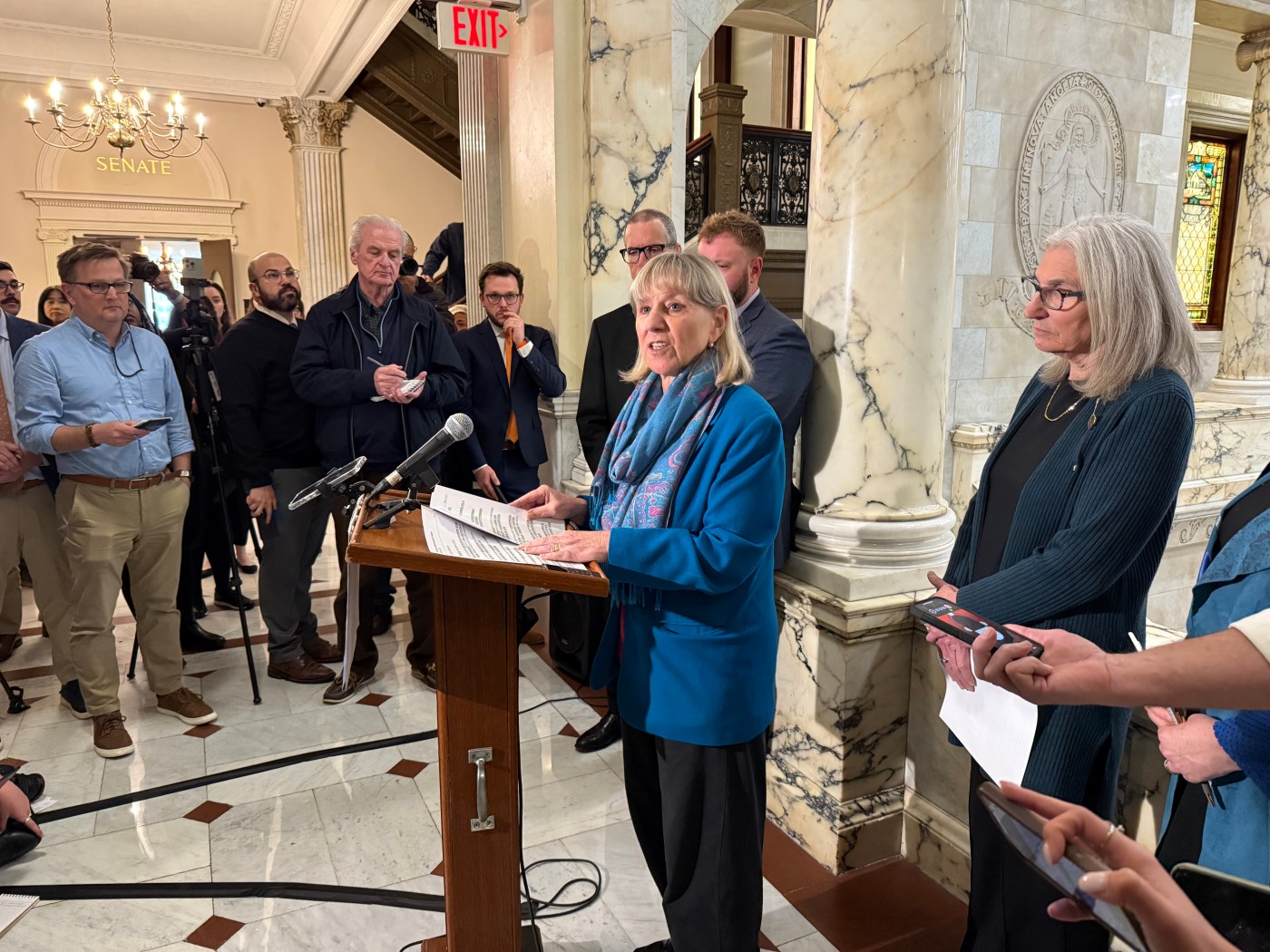
Trump cuts $106M in COVID-era grant funding for Massachusetts as Senate taps pol to lead Democratic response
Senate President Karen Spilka is designating an Arlington Democrat to start crafting the chamber’s response to President Donald Trump’s actions that impact Massachusetts, as the Department of Education cut $106 million in pre-approved K-12 education grant funding for the Bay State.
Beacon Hill Democrats have started to face increasing pressure from progressives to push through policies that attempt to counteract Trump’s efforts to cut federal funding flowing to the Bay State, slash the size of the federal government, and crack down on immigration.
Spilka, an Ashland Democrat, said Sen. Cindy Friedman of Arlington would use the legislative committee she chairs — the Senate Steering and Policy Committee — as a clearing house for policies that respond to the Trump administration.
Friedman, who also leads a subcommittee tasked with responding to Auditor Diana DiZoglio’s efforts to audit the Legislature, will meet with all other Senate committee chairs to start developing responses to conservative actions that affect Massachusetts, according to Spilka.
“We’re working off of that model because I believe it’s really important to utilize the expertise of our chairs because they hear what’s happening, they hear about the cuts, they hear from their constituents from all areas of the state,” Spilka told reporters at the State House.
Democrats who serve in leadership of either chamber already regularly meet with lawmakers who chair subject-specific committees to develop and direct policy. Spilka did not announce any bills filed in conjunction with Tuesday’s announcement nor any imminent legislative hearings.
Friedman served as vice-chair of the Senate’s budget-writing committee last year and was selected this year to chair the Senate Steering and Policy Committee, a move that came with a pay bump.
She had a base pay of $73,655 last year and pulled in $102,340 in “other pay” for a total of $175,995 in 2024, according to publicly available state payroll records. Her annual rate in 2025 jumped to $82,044, and she has been paid $44,428 through March 8, records show.
Progressive advocates in Massachusetts have been hounding legislators to do something about the Trump administration’s move to slash federal funding for a variety of sectors in the state.
Progressive Massachusetts Policy Director Jonathan Cohn said Massachusetts voters have for months wanted to see their elected officials “be bolder and more proactive in protecting” the state against Trump’s “chaos, cruelty, and corruption.”
Cohn said voters want to hear “real answers from Beacon Hill: how we will protect our essential services amidst looming budget cuts, how we will protect marginalized communities, how we will protect civil liberties and our democracy, how we will show a real governing alternative.”
“Somehow, the Senate’s announced response is more comical and more underwhelming than creating a new committee: they held a press conference to let the public know that an existing committee is going to do the work that it should have already been doing,” Cohn said in a statement.
House Speaker Ron Mariano and Spilka pledged in January to change their internal rules this legislative session to promote more efficient and transparent lawmaking after facing a wave of criticism when formal business ended last year without deals on critical bills.
But three months into the session, few major policies have made it to Gov. Maura Healey’s desk, and legislative committees just started over the past several weeks to hold hearings on bills under their purview.
State budget writers have held public meetings on the fiscal year 2026 spending plan.
Spilka’s decision to tap Friedman to lead the response to Trump came the same day the Healey administration announced the U.S. Department of Education had cut $106 million in pre-approved K-12 education grant funding for Massachusetts.
The money was set to flow to Massachusetts through a COVID-19-era fund that the Healey administration claimed it had until March 2026 to utilize. But the governor said the Trump administration notified the state Friday that the cash was being cut off last week.
Healey said the dollars were going to be used to stand up mental health care and math tutoring for students, as well as beefing up school security and installing systems to clean the air in school buildings.
Springfield was in line to receive the most money from the federal government among cities and towns in the state — $47 million — while Boston was in line for $3.4 million, according to the Healey administration.
Healey said the cuts also affected 41 other states and an estimated $2 billion in education-related funding.
“At a time when students are still struggling to recover from the pandemic, we need to be doing everything we can to address learning loss and the youth mental health crisis. Instead, President Trump suddenly ripped away more than $100 million in funding that is supposed to go right to Massachusetts students and schools,” Healey said in a statement.
U.S. Department of Education spokesperson Madi Biedermann said the COVID-19 pandemic is over and states and school districts “can no longer claim they are spending their emergency pandemic funds on ‘COVID relief’ when there are numerous documented examples of misuse.”
“The Biden administration established an irresponsible precedent by extending the deadline for spending the COVID money far beyond the intended purpose of the funds, and it is past time for the money to be returned to the people’s bank account,” Biedermann said in a statement.
Biedermann said the federal agency will consider extensions on an individual, project-specific basis “where it can be demonstrated that funds are being used to directly mitigate the effects of COVID-19 on student learning.”
Spilka said the decision to cut the funding was “horrific and cruel.”
“I am hoping that more happens on a federal level because he is usurping Congressional power,” Spilka said.


